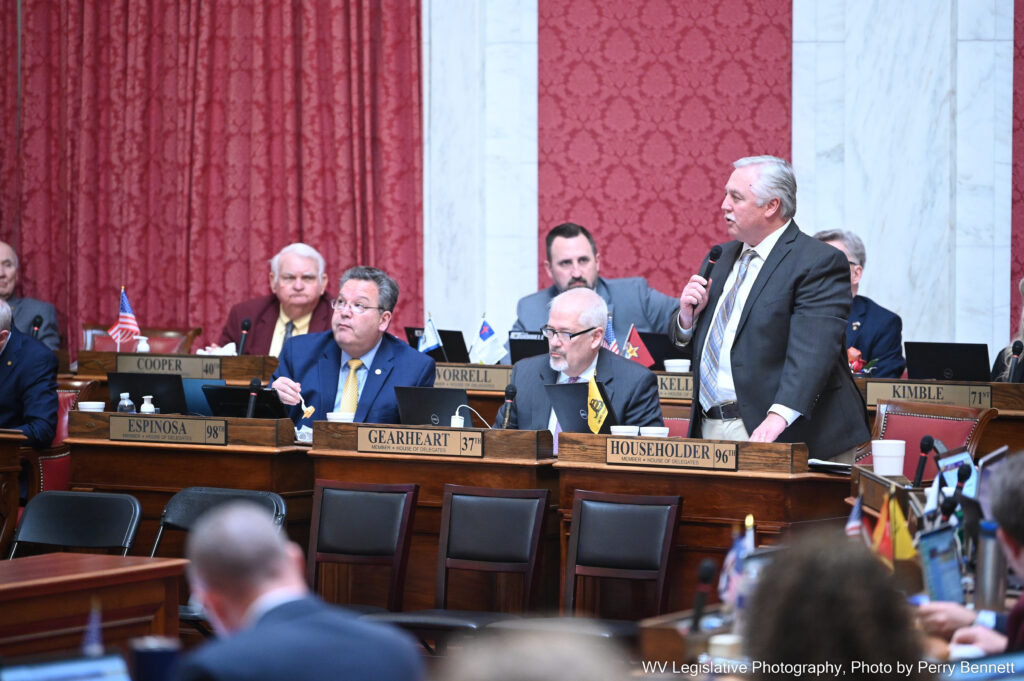As the 2023 legislative session winds down, the House of Delegates passed a number of bills on Friday.
One, Senate Bill 187 would make it a felony offense for a school employee or volunteer to engage in sexual contact with students.
Even if the student consents, or the offense happens outside school limits, the penalty would be one to five years in prison with a fine of up to $5,000.
Larry Kump, R-Berkeley, spoke out against the bill’s passage.
“For certain this legislation troubles me, perhaps the most of any I’ve had to vote on in terms of legislative service, and when the Judiciary had the bill discussion was intense and spirited,” Kump said. “Emotions ran deep and rightly so. First of all, the behavior of these sexual predators is deeply disturbing, but not just in this age group, in any age group.
Larry Rowe, D-Kanawha, asked to clarify the bill’s language regarding coaches and volunteers.
“I think in other sexual offenses, we have an age gap. Like for statutory rape, and if I recollect, I haven’t looked in the statutes in a while since being off Judiciary, but I think in this case, we don’t have that gap?”
Rowe’s question was answered in the affirmative by the bill’s sponsor, Del. Michael Woelfel, D-Cabell. The bill was passed with a 90-7 vote and communicated to the House.
The House also passed Senate Bill 200 which allows the use of leashed dogs to track wounded elk, turkey, and wild boar while hunting. Under the terms of the bill language, the hunter or dog handler must maintain physical control of the leashed dogs at all times. The bill passed on a vote of 95-0 and goes to the governor for his signature.
An amended version of Senate Bill 220 regarding the Industrial Hemp Development Act was passed following discussion about specific products that fall under the original language of the bill which were considered too “broad.”
Products that contain no THC would be exempted under the amended version of the bill which provides regulation of hemp and kratom products by the Department of Agriculture in coordination with the Alcohol Beverage Control administration.
The bill limits the sale of certain kratom and hemp products to anyone under the age of 21. It also removes certain classifications of hemp and provides a regulatory scheme for both products and imposes an excise tax on 11 percent of the retail sale value, with proceeds divided between the Commissioner of Agriculture. The amended version makes it a criminal offense for anyone in violation of unlawful possession, distribution and sale of unapproved products to persons under the age of 21.
The bill was passed on a vote of 92-4 and communicated to the Senate.
Senate Bill 232 would create a multidisciplinary study group to make recommendations regarding diversion of persons with disabilities from the criminal justice system. The group would be overseen by the chair of the Dangerous Assessment Advisory Board which falls within the Department of Health and Human Services. The board issues guidance to the judicial system on custody and supervision of people determined to be incompetent to stand trial.
The bill was passed 95-0, communicated to the Senate and the adopted bill declared effective from passage
Senate Bill 240 requiring state board of examination or registration proceedings to be open to public inspection passed the House with a 74-0 vote which was communicated to the House.
The House passed Senate Bill 298 which clarifies that in non-federally declared emergencies and instances of non-states of emergency that mutual aid agreements can be entered into for reciprocal aid in bordering counties of other states for day-to-day support for fire and emergency medical service calls without the need for approval by the governor.
The bill passed 96-0 and is effective from passage.
After a lengthy reading of the full language of Senate Bill 361 which authorizes miscellaneous boards and agencies to promulgate legislative rules, the bill passed 78-1 and is effective from passage.
In other legislation completed by the House, House Bill 2004 would prevent the use of payment card processing systems for surveillance of Second Amendment activity and discriminatory conduct. The bill is seen as a move that would preempt a move on the part of some credit card companies that require separate merchant codes for firearm sales.
The bill passed by a vote of 98-0 and communicated to the Senate.
The House passed the PFAS Protection Act. House Bill 3189 seeks to identify the risks of perfluoroalkyl and polyfluoroalkyl substances being discharged into source waters used for public drinking water. Under the bill’s terms the Department of Environmental Protection would have to write action plans to address PFAS in public water systems and require facilities using certain PFAS chemicals to monitor and report their use.
The bill passed with a vote of 91-8 and was communicated to the Senate.
In what could be perceived as good news for motorists, the House also passed House Bill 3214 – the Road Optimization and Assessment Data Road Pilot Project. The project is intended to improve and maintain the state’s roads and highways. It includes the use of high-tech GPS and Laser systems to identify future deterioration of roads, including annoyances like potholes, cracks, road shoulder and drainage issues.
The ROAD pilot program passed 94-5 and was communicated to the Senate.




















